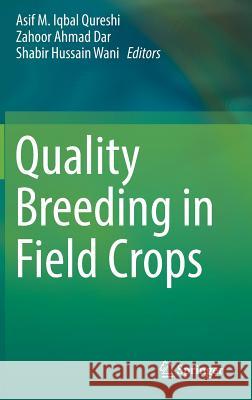Quality Breeding in Field Crops » książka



Quality Breeding in Field Crops
ISBN-13: 9783030046088 / Angielski / Twarda / 2019 / 275 str.
Quality Breeding in Field Crops
ISBN-13: 9783030046088 / Angielski / Twarda / 2019 / 275 str.
(netto: 575,06 VAT: 5%)
Najniższa cena z 30 dni: 578,30
ok. 16-18 dni roboczych.
Darmowa dostawa!
1
Biofortification of Staple Food crops: An overview
Dr Asif B. Shikari, Senior Rice Breeder SKUAST-Kashmir
2
Marker assisted Breeding for improving the cooking and eating quality of rice
Dr Maxwell Darko Asante
Rice Breeder, CSIR-Crops Research Institute Ghana, Africa
3
Genomic approaches for Biofortification of wheat grain with iron and zinc
Dr Velu Govindan ,
Senior Scientist, Wheat Breeder
Global Wheat Program
International Maize and Wheat Improvement Center (CIMMYT) Mexico
4
Marker assisted breeding for Beta carotene rich Maize Hybrids
Dr HS Gupta (Professor) Maize Breeder
Formerly Director General, BISA &
Director, Indian Agricultural Research Institute, India
5
Combating malnutrition through biofortifica
tion of Beans: A genomic perspectiveDr Antonio M. De Ron (Professor), Lugo, Spain &
Dr Dr Francesca Sparvoli CNR, Milan, Italy
6
Dr.Akshay Talukdar,Principal Scientist, Division of Genetics
Indian Agricultural Research Institute, Pusa, New Delhi, India
7
Novel breeding approaches for development of nutritionally improved rapeseed Mustard
Dr.S.K.Gupta, (Professor),Brassicas Breeder,
Genetics, Plant Breeding & Biotechnology SKUAST-Jammu, India
8
Current breeding approaches for increased beta-glucan concentration in Oats
Dr.Gulzaffar (Professor)
Genetics, Plant Breeding & Biotechnology
(Fodder Breeder) SKUAST-
K, India9
Breeding dry beans with improved cooking and canning quality traitsDr Karen Cichy, Dry Bean Geneticist,
USDA ARS, USA Dr Asif M. Iqbal Qureshi, Bean Breeder, SKUAST-Kashmir, India
10
Conventional and molecular approaches for improving grain quality traits in pearlmilletDr. O.P. Yadav Pearl Millet Breeder
Central Arid Zone Research Institute, Jodhpur, ICAR, India
11
Current breeding Approaches for developing rice with improved grain and nutrition quality
Dr NR Sofi . Senior Scientist,
Rice Breeder SKUAST-Kashmir, India
12
Marker Assisted introgression for development of high tryptophan maize
Dr Rajesh Singh (Professor) Maize Breeder
BHU, India
13
Improvin
g the nutritional value of potatoes by conventional breeding and genetic modification.Dr John E. Bradshaw (Professor)
Plant Breeder and Geneticist,(Potato)
Scottish Crop Research Institute, Invergowrie, Dundee, UK
14
Genetic improvement for end use quality in wheat
Nuno Pinheiro, National Institute for Agrarian and Veterinarian Research, Estrada, Portugal
Dr. Shabir Hussain Wani is senior assistant professor at Mountain Research Centre for Field Crops, Khudwani –192101, Sher-e-Kashmir University of Agricultural Sciences and Technology of Kashmir, J&K, India . He received B.Sc. in agriculture from Bhim Rao Agricultural University Agra, India, and M.Sc. in genetics and plant breeding from Central Agricultural University, Manipur, India, and Ph.D. in plant breeding and genetics on “transgenic rice for abiotic stress tolerance” from the Punjab Agricultural University Ludhiana, India. After obtaining his Ph.D. he worked as research associate in the Biotechnology Laboratory, Central Institute of Temperate Horticulture (ICAR), Srinagar, India. He then joined the Krishi Vigyan Kendra (Farm Science Center) as program coordinator at Senapati, Manipur, India. He teaches courses related to plant breeding, seed science and technology, and stress breeding and has published more than 100 papers/chapters in journals and books of international and national repute. He served as guest editor and reviews editor for journal Frontier in Plant Science (2015-2018). He has also edited several books on current topics in crop improvement for abiotic stress tolerance published by Springer Nature and CRC press USA. His Ph.D. research won first prize in the North Zone Competition, at national level, in India. He was awarded a Young Scientist Award from the Society for Promotion of Plant Sciences, Jaipur, India, in 2009. He is a fellow of the Society for Plant Research, India. Recently he also received Young Scientist Award (Agriculture) 2015 from Society for Plant Research, Meerut, India. He also served as visiting Scientist at Department of Plant Soil and Microbial Sciences, Michigan State University, USA under the UGC Raman Post Doctoral Fellowship programme. He has attended several international and national conferences, presenting his research.
Development of superior crops that have consistent performance in quality and in quantity has not received the same emphasis in the field of genetics and breeding as merited. Specialty trait requires special focus to propagate. Yet basic germplasm and breeding methodologies optimized to improve crops are often applied in the development of improved specialty types. However, because of the standards required for specialty traits, methods of development and improvement are usually more complex than those for common commodity crops. The same standards of performance are desired, but the genetics of the specialty traits often impose breeding criteria distinct from those of non-specialty possessing crops. Specifically, quality improvement programs have unique characteristics that require careful handling and monitoring during their development for specific needs. Adding value either via alternative products from the large volumes of grain produced or development of specialty types is of interest to producers and processors. This work assimilates the most topical results about quality improvement with contemporary plant breeding approaches.The objective of this book is to provide a summary of the germplasm, methods of development, and specific problems involved for quality breeding. In total, fourteen chapters, written by leading scientists involved in crop improvement research, provide comprehensive coverage of the major factors impacting specialty crop improvement.
1997-2026 DolnySlask.com Agencja Internetowa
KrainaKsiazek.PL - Księgarnia Internetowa









